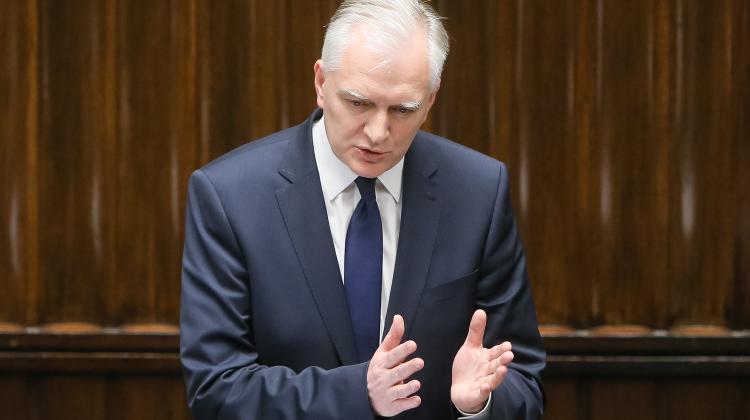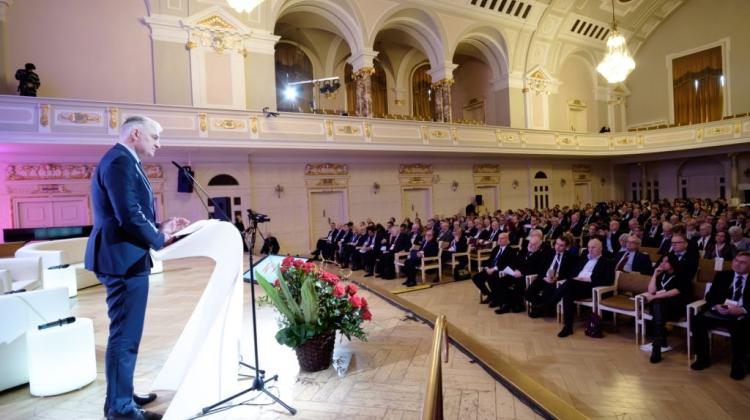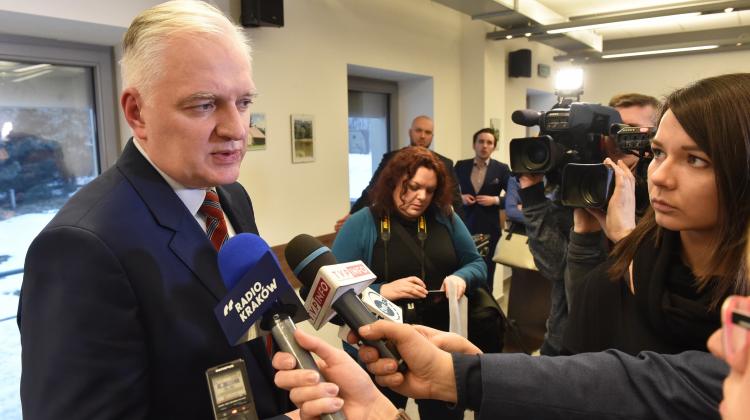Gowin: The reforms failed to meet the needs of science and universities
 Photo: PAP 2016 / Paweł Supernak
Photo: PAP 2016 / Paweł Supernak
Higher education under the PO and PSL government saw two reform attempts, but an authoritarian manner of the implementation of changes and their pace meant that the content of the reforms failed to meet the needs of science and universities - Deputy Prime Minister, Minister of Science and Higher Education Jaroslaw Gowin said on Wednesday in the Sejm.
"Great effort made in the past eight years to reform both higher education and science system in Poland not only failed to bring positive solutions, but unfortunately during that time we went back in relation to the competition. This is not a political thesis. This thesis justified by such criteria as the place of Poland in the rankings of universities or the innovation rankings. Today we do not start again from the starting point, but from the need to make up for regression" - said the Minister of Science, presenting in Parliament the balance of the PO-PSL rule in the field of science and higher education.
He reminded that in 2011-2014 there were two deep attempts to reform higher education. "The intentions of this reform were positive. The idea was on the one hand to adapt the higher education system to the Bologna system, on the other hand to develop objective criteria for the evaluation of scientific and educational activities to enable increased competitiveness among universities. But the results are not that positive" - emphasized Gowin.
In his opinion, one of the reasons for the failure of the reform were the "arbitrarily make changes". As he spoke, the basis for these reforms was a report prepared by one of the international consulting companies. "However, neither the content of this report, not the scope of reforms were consulted with the academic community" - said Gowin. He recalled that an extreme example of the authoritarianism of the then Ministry (led by Barbara Kudrycka - ed. PAP) was the case of attempted audit of the Jagiellonian University in relation to Paweł Zyzak\'s master\'s thesis.
Paweł Zyzak\'s book "Lech Wałęsa. Idea i historia" ("Lech Walesa. Idea and History") was based on his thesis defended in 2008 at the Faculty of History of the Jagiellonian University. In the book Zyzak wrote that Lech Walesa was a Security Service operative, and in his youth he had an illegitimate child. After the publication, the then Minister of Science Barbara Kudrycka submitted a request to the National Accreditation Committee for an audit of the Faculty of History of the Jagiellonian University. Later she withdrew the request.
"The authoritarian style of introducing changes stopped at the moment of taking the minister of science office by Lena Kolarska-Bobińska. The problem was that at the time all the legislative solutions were ready. But the content of these solutions is heavily detached from the needs of Polish universities and Polish science" - said Gowin.
Today - he believes - Polish universities groan under the yoke of excessive regulation. "At the moment we are finalizing the attempt to remove this huge burden of useless administrative duties from the universities" - he said. He added that the process is supported by members of the opposition.
According to Gowin additional problem accompanying the changes was the pace of their introduction, resulting in a huge chaos. "The Higher Education Law was subject to so many amendments that currently it is unreadable in many aspects. In academia there is a general consensus (..) as to the need for a new law" - he added.
In his speech, Gowin also drew attention to such measures of the effects as the global university rankings. "The best Polish university is in the 4th hundred in the Shanghai ranking. And, unfortunately, this position is declines from year to year" - he said.
He pointed out that despite spending billions on innovation, in the ranking of innovation Poland fell to the lowest category in the European Union. Poland won only 15 most prestigious European grants, awarded by the European Research Council (ERC), while, for example smaller Hungary won 35.
"We have outstanding research institutes, which are underfunded, and we have the research institutes in name only, the sole source of income of which is property rental. They are in the area of the total lack of control by the state. The adopted legal solutions resulted in the state deprived of any instruments to influence the shape of activity of research institutes. The huge scientific potential of these institutions is fragmented and underused" - said Gowin.
He pointed out that many laboratories and research centres that have impressive research equipment "are empty". "When building these centres, the authorities failed to provide the means necessary for their operation" - said Gowin. One such centre - he added - is the EIT+ in Wroclaw, which now has no funds for research and daily operations.
Gowin admitted that he found signs of mismanagement and financial irregularities only in one area of activity of the previous management of the science ministry - in the area of funding the National Centre for Research and Development.
He noted that his predecessor Minister Lena Kolarska-Bobińska, in her last days in office ordered an audit at the National Centre for Research and Development. "This audit unfortunately confirmed irregularities related mainly to group of BRIdge programs. There have been situations such as exceeding the amount of grant agreements by 90 million (PLN - ed. PAP). This amount of 90 million is not in the budget of the National Centre for Research and Development" - said Gowin. He explained that there were cases of conflict of interest and unequal treatment of applicants.
"The result of the audit (...) is my request for action on the part of the Central Anti-Corruption Bureau" - added Gowin.
The minister said that the irregularities at the National Centre for Research and Development could also occur when spending the funds for promotion. He admitted a disproportionately large portion of these funds went to "certain media group" which included, for example, "Gazeta Wyborcza" and "Newsweek", as well as a web portal created by Tomasz Lis.
"At the moment we have completed the audit, we are waiting for follow-up clarification from the National Centre for Research and Development, and if the preliminary audit findings are confirmed - with regret I will have to initiate legal action" - said Gowin.
He noted that in the case of the National Centre for Research and Development activities, EU funds were being spent, rather than invested. The result of this philosophy - according to the minister - is "a dramatically low level of commercialisation, industrial applications of projects financed by the Centre".
PAP - Science and Scholarship in Poland
lt/ ekr/ agt/ abr/ mrt/
tr. RL
Przed dodaniem komentarza prosimy o zapoznanie z Regulaminem forum serwisu Nauka w Polsce.


















